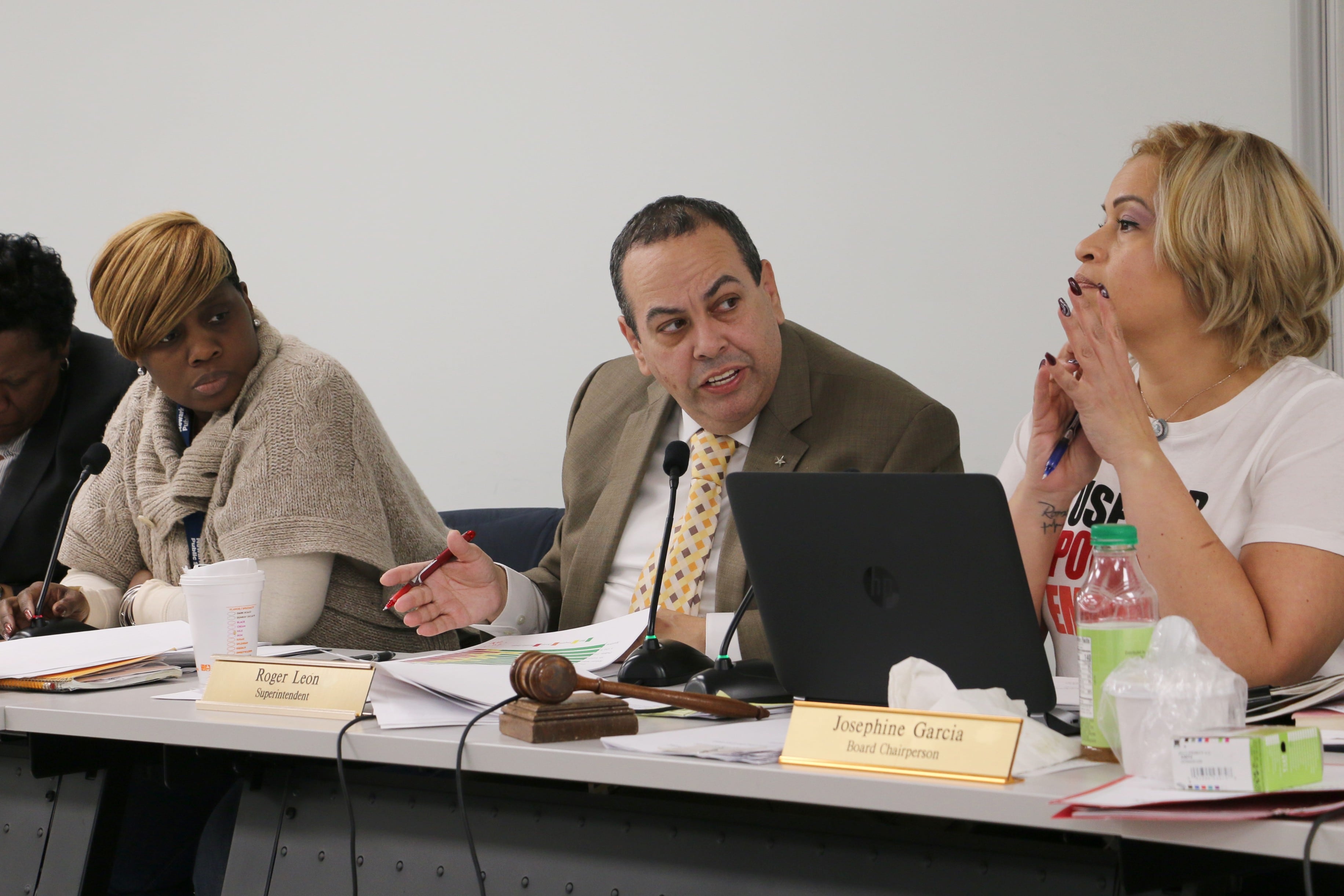Six weeks after the coronavirus pandemic shuttered Newark school buildings, the district faces urgent challenges around attendance, enrollment, virtual learning, and meal distribution.
But instead of convening a formal meeting this month to publicly discuss those issues, the Newark school board held private sessions with Superintendent Roger León, according to multiple attendees. The closed-door sessions limit transparency and accountability and may violate state rules, advocates and experts said.
The board’s “role is to work with the superintendent and be the liaison between the school district and the community,” said Deborah Smith-Gregory, president of the Newark NAACP. “They need to have a meeting and stop playing.”
Last month, the board voted unanimously to suspend its bylaws and expand León’s authority during the pandemic.
Several board members did host a virtual question-and-answer session with families this week, and León joined a virtual parent meeting earlier this month. And the board had no choice but to cancel a reorganization meeting this month that was supposed to take place after the school board election, which the governor moved to May.
However, the board has not scheduled a new public meeting this month to replace the one that was canceled. Instead, small groups of board members met with León and other district officials on Tuesday in virtual sessions that were not open to the public, attendees said.
Each session lasted about two hours and touched on pressing matters related to the pandemic, according to board members. For instance, León discussed how many staff members have tested positive for the virus, emergency funding the district has received, and the delay in “match letters” that tell families which schools their children will attend this fall, the members said.
Under New Jersey’s Open Public Meetings Act, meetings of the full board must be public, but smaller committees can meet privately to discuss specific matters such as personnel and curriculum. However, the law prohibits school boards or other public entities from convening multiple small-group meetings in order to avoid holding a public meeting of the full board.
The board’s sessions this week, in which three members at a time met with León to discuss general district matters, could potentially run afoul of the public meetings law, said Walter Luers, president of the New Jersey Foundation for Open Government.
“What they can’t do is say, ‘Okay, I’m going to have a meeting with the first three [board members], and then discuss the same issues with the second three, and then the third three. That’s called a chain meeting,” he said. “They’re not supposed to do that.”
Board President Josephine Garcia did not immediately respond to a request for comment.
District spokeswoman Nancy Deering said the board’s reorganization meeting was rescheduled for May 19 due to the change in the board election date. She added that León has met with many people during the coronavirus crisis.
“The superintendent has held countless meetings with stakeholders during this pandemic and actually since the start of his administration,” she said in an email, “and that includes sitting in committee meetings with members of the board.”
Board member Tave Padilla said the board’s committees did not meet this month, which eliminated the need for a full board meeting to report out on the committees’ work. He added that León’s private briefings were intended to keep board members informed, not shut out the public.
“I don’t think he would do anything to deceive anybody,” Padilla said. “He’s been nothing but transparent.”
However, the lack of an official board meeting this month has left the public waiting for answers to urgent questions about how students are faring during the pandemic. For instance, how many students are logging into virtual classes? How many students still need laptops in order to learn from home? And how are schools providing services virtually to students with special needs?
Unlike many New Jersey districts, Newark has not released the school closure plan that all districts were required to submit to the state, further limiting the public’s understanding of how Newark is responding to the crisis.
“The community has questions, and I think it’s the board’s responsibility to answer those questions,” said board member Reginald Bledsoe.
Bledsoe also noted that the board can only vote on district policy or spending at official meetings, not small-group sessions like those held this week. It’s crucial that the full board meet in order to fulfill its oversight role and share vital information with the public — especially during a health crisis, he added.
“I think there’s a need for an official meeting,” he said. “There needs to be information given on the record.”
As part of the board’s ongoing “parent engagement tour,” four board members hosted a virtual forum Wednesday that members of the public could watch online. León gave brief remarks, and board members answered questions submitted by the public. They shared useful information, including where students can pick up free meals, the date of the board election, and when assignments for the marking period were due. Nearly 300 people tuned in.
Yolanda Johnson, a Newark parent organizer, said that families have been eager for information sessions like the one Wednesday.
“That’s what they want right there,” said Johnson, who runs the group Parents Educating Parents. However, she does not believe the forum can substitute for an official board meeting, where members of the public are allotted speaking time and officials share important information, such as attendance data.
“We should have had a board meeting this month so we can be updated on post-COVID 19,” she said, referring to the disease caused by the coronavirus.
Denise Cole, a Newark education advocate and former school board candidate, agreed. She said monthly board meetings allow the public to provide feedback on policies and get information, which is especially important during a pandemic.
“Right now, the public doesn’t know what’s going on in our schools because of the lack of transparency,” she said, adding, “We still have the right to speak and have our voices heard.”





